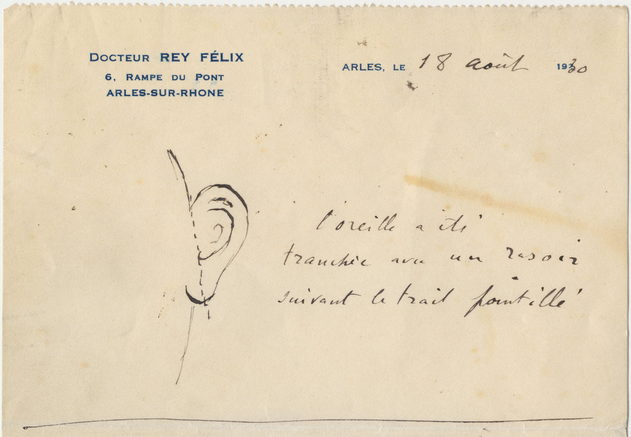A Chunk of Van Gogh’s Ear,Caught in the Act: Promiscuous Sex Life of My D-Cup Mother in law (2025) and Other News
On the Shelf

A 1930 letter from Dr. Félix Rey shows Van Gogh’s mutilated ear. Photo: The Bancroft Library, University of California, Berkeley, via the New York Times.
- The Four Seasons, that venerable glass cube for hungry rich people, is closing. You could mourn the unseemly ritual of the three-martini power lunch, the potent varieties of affectation and entitlement on display among the clientele, or the astronomical sums exchanged in pursuit of ever-tackier varieties of conspicuous consumption. But better just to remember the modernist feats of the place itself: “The Four Seasons opened in 1959 at the base of the Seagram Building, Ludwig Mies van der Rohe’s city-reshaping black skyscraper on Park Avenue—a building that the late critic Herbert Muschamp, with slight but understandable hyperbole, once called the greatest work of architecture of the past thousand years. The architect Philip Johnson was tasked with designing the space, which he paneled in rich burled walnut; delicate window coverings made of aluminum beads made the light appear to dance. Diners sat in nimble, cantilevered chairs of Mies’s design; Eero Saarinen kitted out the women’s powder room with his well-known tulip chairs; and Ada Louise Huxtable, not yet the doyenne of New York architecture critics, had a hand in everything from the champagne flutes to the bread baskets. For the writer Paul Goldberger, Johnson’s design of the Four Seasons substantiated a modernism that was more than mere functionalism—and proved ‘the notion that modernism could, in fact, deal in emotion.’ ”
- Today in longstanding debates about deceased painters’ body parts: Van Gogh scholars continue to argue about the fate of his left ear. Nina Siegal speaks to those on both sides: “Did he simply slice off a little chunk of his ear, or did he lop off the entire ear? … A note written by Félix Rey, a doctor who treated Van Gogh at the Arles hospital, contains a drawing of the mangled ear showing that the artist indeed cut off the whole thing … [Biographers Stephen] Naifeh and [Gregory] White argue that witnesses who saw Van Gogh after Dr. Rey, including his brother Theo’s wife, Johanna van Gogh-Bonger, the artist Paul Signac and Van Gogh’s doctor in Auvers-sur-Oise, Dr. Paul Gachet, said that the entire ear was not missing. They all ‘saw a portion of the mutilated ear remaining—so much, in fact, that, when Vincent was seen from face-on, the damage could go unnoticed,’ they wrote.”
- Why did Google delete Dennis Cooper’s blog? Tobias Carroll investigates—but this is Google we’re talking about, so there is no such thing as “knowledge”: “Over the years, Dennis Cooper’s blog has become a go-to spot for those who appreciate challenging, bold, experimental literature. Cooper has frequently championed books on indie presses and literary work in small journals, using his own influence to point readers in the direction of other work that they might enjoy. (Many writers I know have been thrilled to have been included in lists of highlights from Cooper’s recent reading.) Over time, the site has gradually become a place where devotees of avant-garde fiction can learn more about what’s new in that particular corner of literature … There remains no indication of whether Cooper’s account has been entirely deleted or whether some form of recovery is possible—or, for that matter, of why Google felt the need to delete Cooper’s e-mail account and blog to begin with.”
- Now that Helen DeWitt’s The Last Samurai is back in print, it gets another shot at a much-deserved wider readership. Christian Lorentzen talked to DeWitt about it, and about her grievances with the publishing industry:“At the core of The Last Samuraiis the notion that most people don’t meet their potential because the culture teaches them to assume there are things they just can’t do. The central example is Ludo reading Homer in the original Greek. ‘The Greek alphabet looks more daunting than it really is,’ DeWitt said. ‘I could get anybody reading the Greek script in an hour. I thought that this could be something that I could reveal in the book. People might read the novel and think, Gosh, if somebody had introduced this to me I could have done it.And so now I can have a grievance against our education system, just like the author of this book.’ ”
- As massively multiplayer video games attract a wide audience of spectators, the medium seems less like an extension of entertainment and more an extension of sport, as Willie Osterweil writes: “There is a deep-rooted tendency to associate sports with moments of courageous overcoming, with displays of physical strength, grace, and beauty. E-sports contain literally none of these, which means they are particularly well positioned to reveal all the other things that actually make up sport: the reification of competition, victory, and glory; patriarchal nationalism; and the formation of hierarchal social groups anchored in the protocols of spectatorship. With neither the physical drama that marks most spectator sports nor formal official recognition by Olympic bodies or other sports authorities, e-sports serves a new demand for a different kind of spectatorship: they provide a consolation specially attuned to the new subjects of digitally dominated postnational perma-crisis capitalism—subjects like me, who were raised playing, watching, and loving video games.”